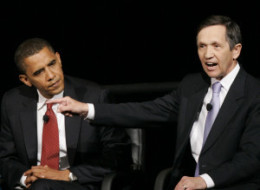Dennis Kucinich: Primary Challenge To Obama Could Make Him A 'Stronger Nominee'
Friday, February 11, 2011
Obama was supposed to be a transformative politician . His election was seen by many not only as the end of the eight year-long Bush era nightmare, but also as the final curtain for thirty years of neoliberal politics dating back to at least Reagan. From day one, plenty of liberals were ready to anoint him as the most progressiv e president in history.
Now, two years into his presidency, such grand hopes have faded. Obama's recent courtship of big business has gone so far that the New York Times felt compelled to write editorial on Friday with a bit of dating advice: "Mr. Obama must take care not to let his agenda be taken over entirely by corporate interests. They do not belong to the only constituen cy he serves... Mr. Obama should keep in mind that the interests of corporatio ns and their bosses are not necessaril y always aligned with those of the country."
To add insult to injury, the cover of the latest issue of TIME Magazine is titled, "Why Obama Loves Reagan," and features a photoshopped picture of their budding "bromance" : the two stand laughing hysterical ly, Reagan with his arm around Obama's shoulder. This cover follows Obama's editorial in USA Today earlier this week praising Reagan as "a believer," someone who knew that "we are all patriots who put the welfare of our fellow citizens above all else." Yes, for those who have forgotten, we must all thank Ronald Reagan for his devotion to ushering in a classless utopia.
In the wake of Obama's ongoing drift to the right, many progressives find themselves asking what happened to the Obama they thought they knew, the guy who spoke to the aspiration s of millions of ordinary Americans during his presidenti al campaign?
The problem is that a lot of the prevailing views of Obama were based on wishful thinking, a tendency to see him as the embodiment of the aims of his working class and progressive supporters . This was never the real Obama. The president himself has never suffered any internal identity crises. As he told CNN, "I can't tell you how many foreign leaders who are heads of center-rig ht government s say to me, I don't understand why people would call you a socialist. In my country, you'd be considered a conservati ve." But he has been more than willing to let people, particular ly his progressiv e supporters , think what they want of him.
KEEP READING
Read the Article at HuffingtonPost










0 comments:
Post a Comment